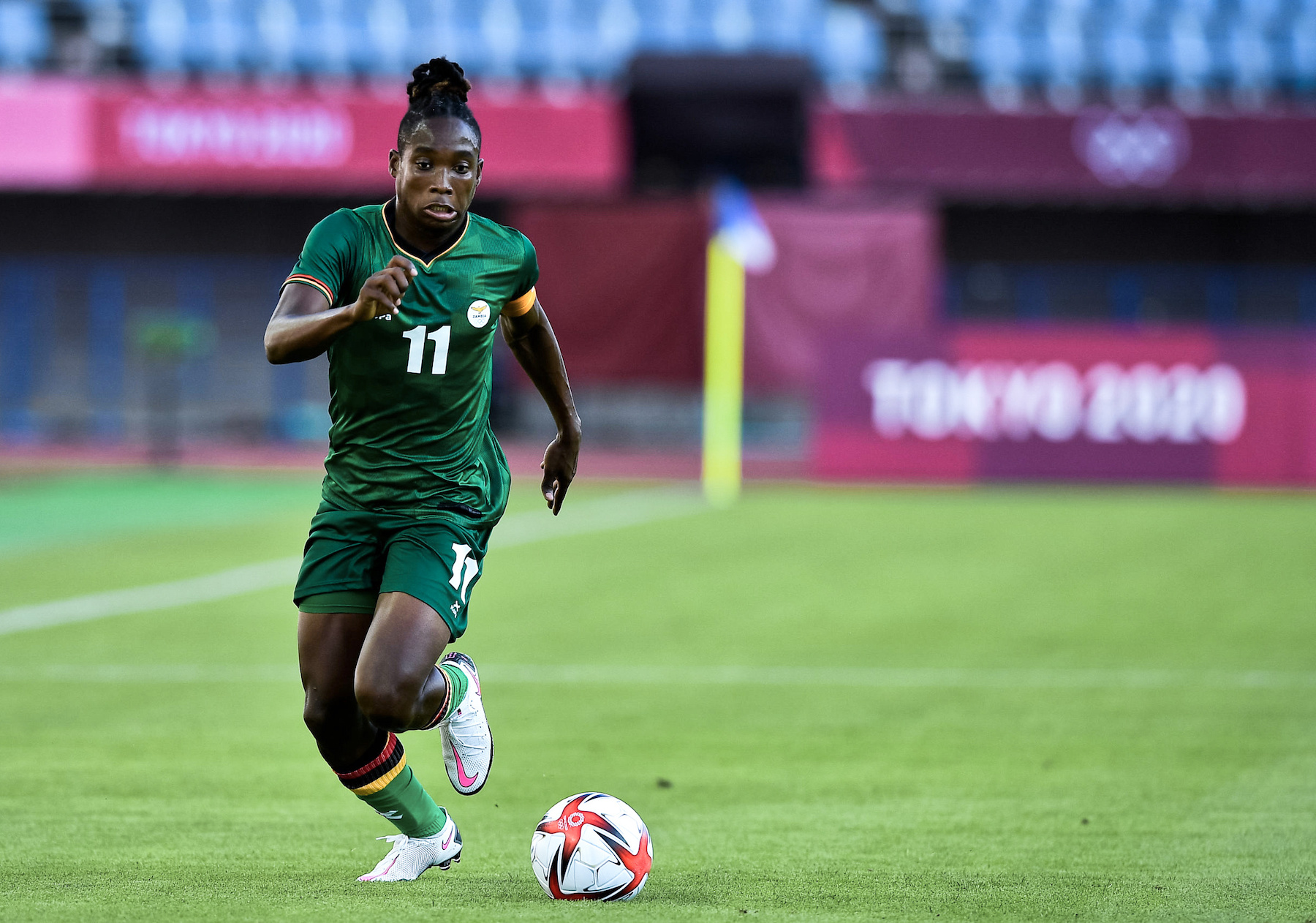Barbra Banda talks about a year 2021 in which she gained global notoriety and the future
Very few footballers in the world rose to prominence in 2021, quite like Zambian striker Barbra Banda. A household name to those who follow women's football in depth, but perhaps unknown to many, Banda changed that in the space of four incredible days during the Summer Olympics in Tokyo.
It was the Copper Queens' first-ever appearance at a women's soccer tournament, and ranked outside the world's top 100, few gave them a chance to compete in a group that included China, Brazil and the champions from Europe, the Netherlands.< /p>
A 10-3 loss in their opener to the latter widened the gap, but was memorable for the 21-year-old scoring an extraordinary hat-trick, with two or more goals in the space of one minute towards the end of the game with the result already beyond doubt.
As if that weren't enough, Banda netted another hat-trick three days later in a thrilling 4-4 draw against China, becoming the first player to score back-to-back Olympic hat-tricks.
Sitting in her hotel room in China where she is subject to mandatory isolation after returning from a national team camp, Banda reflects on a period that propelled her in the eyes of the world to the most large stage available. “I never thought I would represent Zambia on this kind of stage,” she says. "I always thought it was a matter of hard work and determination that would get you there, and then all of a sudden I found myself representing my country at the Olympics."
Throughout our interview, Banda is humble, but more than anything, she continually insists that her entire career has been, and will continue to be, about hard work, determination, that she isn't close to achieving what she wants yet, even reflecting that the tournament was somewhat underwhelming despite what they were up against and the personal story she made.
"We didn't do our best to get to the second round, but for our team, just being there was a great achievement, for our country, for Africa, because we were the only African team there. It was history for us just to qualify for Tokyo. The achievement of scoring those two hat-tricks, it's just the result of what kind of person I am. I work hard, I'm always there for my team and for my country and all I do is do my best for my country."
Although she only turned 21 this year and still has much of her career ahead of her, it has been a long and bumpy journey for Banda just to get to where she is now, growing up in a country where women's football was far from important.
Banda joined an academy as a youngster and spent over 10 years there, and it was the motivation she received from her father in particular that inspired her to pursue her dream. "For me, I started very early, I was just going to play football with my dad. At the academy, that's when I started playing competitively in a women's league in Zambia .
“Things happened pretty quickly. the Under-17 World Cup in Costa Rica."
Yes, at just 13 years old, Banda was representing her country at a major FIFA tournament, where she was incredibly only the second youngest player behind 12-year-old Ghanaian defender Fuseina Mumuni; a tournament that saw Banda suddenly grace the same pitches as other promising youngsters such as Deyna Castellanos, Lea Schüller, Jessie Fleming, Patri Guijarro and Aitana Bonmatí.
"After that I changed clubs, I went to a bigger club, the Green Buffalos in Zambia. I think that's when I started with the national team senior and that I started to be a little better known to people.
"Over time, I was always so inspired by my father", she recalls...


Very few footballers in the world rose to prominence in 2021, quite like Zambian striker Barbra Banda. A household name to those who follow women's football in depth, but perhaps unknown to many, Banda changed that in the space of four incredible days during the Summer Olympics in Tokyo.
It was the Copper Queens' first-ever appearance at a women's soccer tournament, and ranked outside the world's top 100, few gave them a chance to compete in a group that included China, Brazil and the champions from Europe, the Netherlands.< /p>
A 10-3 loss in their opener to the latter widened the gap, but was memorable for the 21-year-old scoring an extraordinary hat-trick, with two or more goals in the space of one minute towards the end of the game with the result already beyond doubt.
As if that weren't enough, Banda netted another hat-trick three days later in a thrilling 4-4 draw against China, becoming the first player to score back-to-back Olympic hat-tricks.
Sitting in her hotel room in China where she is subject to mandatory isolation after returning from a national team camp, Banda reflects on a period that propelled her in the eyes of the world to the most large stage available. “I never thought I would represent Zambia on this kind of stage,” she says. "I always thought it was a matter of hard work and determination that would get you there, and then all of a sudden I found myself representing my country at the Olympics."
Throughout our interview, Banda is humble, but more than anything, she continually insists that her entire career has been, and will continue to be, about hard work, determination, that she isn't close to achieving what she wants yet, even reflecting that the tournament was somewhat underwhelming despite what they were up against and the personal story she made.
"We didn't do our best to get to the second round, but for our team, just being there was a great achievement, for our country, for Africa, because we were the only African team there. It was history for us just to qualify for Tokyo. The achievement of scoring those two hat-tricks, it's just the result of what kind of person I am. I work hard, I'm always there for my team and for my country and all I do is do my best for my country."
Although she only turned 21 this year and still has much of her career ahead of her, it has been a long and bumpy journey for Banda just to get to where she is now, growing up in a country where women's football was far from important.
Banda joined an academy as a youngster and spent over 10 years there, and it was the motivation she received from her father in particular that inspired her to pursue her dream. "For me, I started very early, I was just going to play football with my dad. At the academy, that's when I started playing competitively in a women's league in Zambia .
“Things happened pretty quickly. the Under-17 World Cup in Costa Rica."
Yes, at just 13 years old, Banda was representing her country at a major FIFA tournament, where she was incredibly only the second youngest player behind 12-year-old Ghanaian defender Fuseina Mumuni; a tournament that saw Banda suddenly grace the same pitches as other promising youngsters such as Deyna Castellanos, Lea Schüller, Jessie Fleming, Patri Guijarro and Aitana Bonmatí.
"After that I changed clubs, I went to a bigger club, the Green Buffalos in Zambia. I think that's when I started with the national team senior and that I started to be a little better known to people.
"Over time, I was always so inspired by my father", she recalls...
What's Your Reaction?















![Three of ID's top PR executives quit ad firm Powerhouse [EXCLUSIVE]](https://variety.com/wp-content/uploads/2023/02/ID-PR-Logo.jpg?#)







